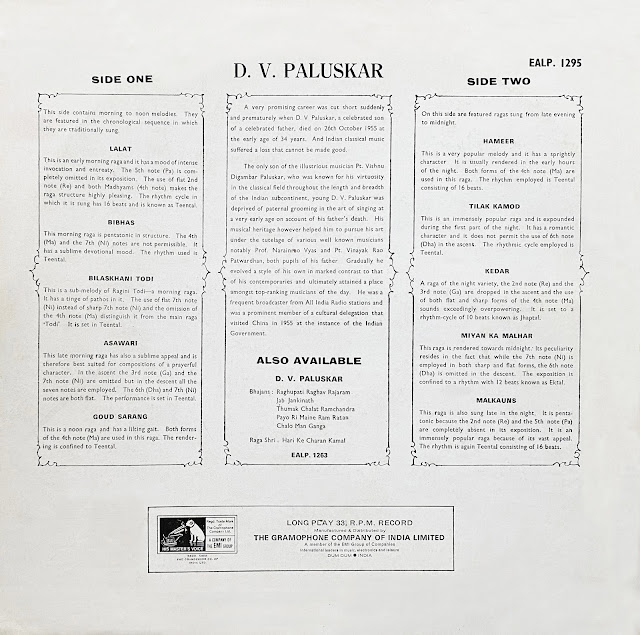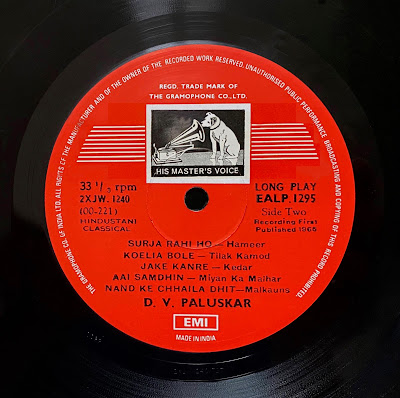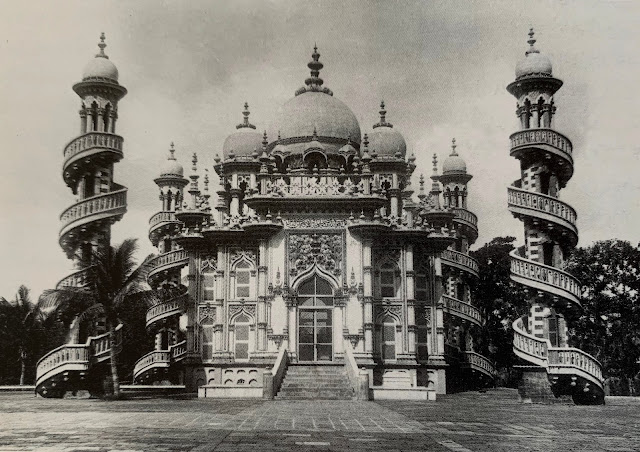INDIA – INDE
Pandit D. V. Paluskar – His Master’s Voice – EALP 1295, released 1965 (LP)
Dattatreya Vishnu Paluskar, aka D.V. Paluskar (1921–1955), born into an eminent musical family in the holy city of Nashik, near Mumbai, Maharashtra, was a major 20th century Hindustani vocalist. His father Vishnu Digambar Paluskar (1872-1931) was a master of the Gwalior Gharana and a renaissance man who pioneered the popularization of classical and devotional music among the masses.
Paluskar senior viewed music as the expression of deep religious faith and devotion, and trained his prodigiously gifted son until his death in 1931 when D.V. was ten. D.V. completed his apprenticeship under the guidance of two of his father’s most accomplished disciples Vinayakrao Patwardhan (1898-1975) and Narayanrao Vyas (1902-1984).
D.V. Paluskar got his first major exposure on the Indian classical music stage at his debut performance at the Harvallabh Sangeet Sammelan in Punjab at the age of 14. By performing frequently throughout the country, All India Radio broadcasts of his music and Paluskar’s many 78 RPM releases, Paluskar quickly established himself as a highly esteemed and immensely popular artist.
This excellent 1965 reissue of Paluskar 78 RPMs showcases his masterful free-flowing melodious lyrical singing delivered with understated perfection.
Around the time of India’s Independence in 1947, Paluskar championed his father’s double legacy as a worthy and devout torchbearer of tradition and a modernist in sync with changing times and tastes, willing to reach out to new audiences. His sudden death in 1955 at the age of 34 following an encephalitis brain inflammation was a truly tragic loss.
Dattatreya Vishnu Paluskar, ou D.V. Paluskar (1921–1955), né dans une éminente famille musicale dans la ville sainte de Nashik, près de Mumbai, Maharashtra, fut un chanteur Hindustani majeur du XXe siècle. Son père, le maître du Gwalior Gharana Vishnu Digambar Paluskar (1872-1931), fut un visionnaire qui s’évertua à diffuser la musique classique et dévotionnelle auprès du plus grand nombre.
Paluskar père, qui considérait la musique comme l'expression de la foi et de la dévotion religieuse, forma son fils surdoué jusqu'à sa mort en 1931 alors que D.V. n’avait que dix ans. Ce dernier pursuivit son apprentissage sous la tutelle de deux des plus grands disciples de son père Vinayakrao Patwardhan (1898-1975) et Narayanrao Vyas (1902-1984).
A l'âge de quatorze ans, D. V. Paluskar fît sensation sur la scène de la musique classique indienne lors de son premier concert au Harvallabh Sangeet Sammelan au Pendjab. En se produisant par la suite fréquemment dans tout le pays, en bénéficiant d’une diffusion nationale de sa musique par la All India Radio, et en publiant des 78 tours trés prisés, D. V. Paluskar s'impose à la fois comme un artiste immensément populaire et tenu en haute estime par ses pairs.
Cette excellente collection de 78 tours publiée en 1965 présente la grande maestria tout en retenue de son chant fluide, lyrique et mélodieux.
À l'ère de la renaissance culturelle à l'époque de l'indépendance de l'Inde en 1947, Paluskar défendait ainsi le double héritage légué par son père : être un digne héritier de la tradition, ainsi qu'un moderniste en phase avec l'évolution de son temps et des goûts musicaux, désireux d'atteindre de nouveaux publics. Sa mort soudaine en 1955 à l'âge de 34 ans suite à une encéphalite fut réellement une perte tragique.
* * *
In Great Masters of Hindustani Music (1981), Susheela Misra (1922-1998) praises the role musicologist Vishnu Narayan Bhatkhande (1860-1936) – who wrote the first modern treatise on Hindustani classical music – and D.V. Paluskar’s father Vishnu Digambar Paluskar had in salvaging Hindustani music:
“Music was one of the casualties of foreign rule in our country. In the lethargic age which preceded our political struggle, this fine art fell from its high pedestal into low, illiterate society, and lay there uncared for, and looked down upon. It were the two Vishnus, Vishnu Narayan Bhatkhande and Vishnu Digambar Paluskar who salvaged our music which had been submerged for years under the cold waves of public apathy and alien contempt.
Thanks to these two reformers, however, today Hindustani classical music is no longer confined to an esoteric circle, but is an art within the reach of every aspiring home.”
Photographs below are from Yantra: The Tantric Symbol of Cosmic Unity by Madhu Khanna, Thames & Hudson, 1979, and Arts of India: 1550-1900, Victoria & Albert Museum, 1990:








Thank-you!
ReplyDeleteThank you very much!
ReplyDelete